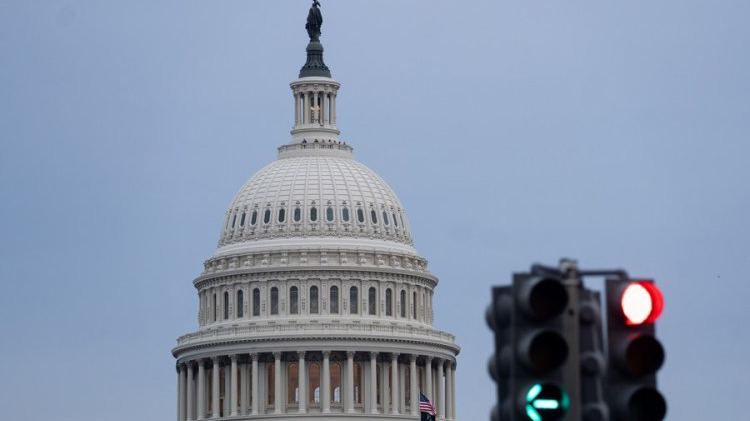
The U.S. Capitol building in Washington, D.C., U.S., December 8, 2022. [Photo/Xinhua]
By Zhou Wenxing
It has been widely reported by U.S. media that the U.S. House of Representatives passed a bill entitled "PRC Is Not a Developing Country Act" with a 415-0 vote on March 28. Previously, a similar bill called "Ending China's Developing Nation Status Act" was introduced by the Senate in February. It should not go unnoticed that such moves by U.S. Congress will merely further deteriorate China-U.S. relations in the context of so-called strategic competition between the two countries.
Apparently, both bills aim at calling for revocation of China's developing country status. As stated in the bill passed in the House, it should be the policy of the U.S. to "oppose the labeling or treatment of the People's Republic of China as a developing country" in any treaty or other international agreement and international organization, and "pursue the labeling or treatment of the People's Republic of China as an upper middle income country, high income country, or developed country in each international organization of which the United States is a member."
It is beyond all doubt that such actions taken by the U.S. Congress once again reflect the increasingly competitive and confrontational strategic consensus on China in the U.S.
To begin with, both bills attempt to achieve America's self-interested strategic goal of politicizing China's status as a developing country and thus hindering China's development. Indeed, America has been implementing an increasingly antagonistic strategy towards China. The Congress has introduced more than 100 Taiwan region-related bills in the past two years since the Joe Biden administration. Some of the bills, such as those advocating for helping to arm China's Taiwan region to defend itself from the alleged possible invasion by the Chinese mainland, will undoubtedly have a subversive effect on the strategic stability of China-U.S. relations.
Secondly, the bills are yet another vivid manifestation of America's "whole-of-government approach" towards China. Although both bills were sponsored by the Republicans, they were co-sponsored and supported by the Democrats from both chambers of Congress. What's more, they also signify that the legislative and executive branches, for example, the Congress and the White House, are increasingly aligned in their policy stance on China since both bills authorize the Congress to "direct the Secretary of State to take certain actions." As a matter of fact, the Biden administration is highly cooperative with the Congress on various issues, which partly explains why China-U.S. relations have not yet improved in the past two years.

A view of the zero-carbon demonstration zone under construction in Boao, south China's Hainan Province, February 24, 2023. [Photo/Xinhua]
However, the U.S. efforts to politicize China's status as a developing country cannot hold water and will only embrace failure.
First of all, it is impetuous of the U.S. to suspend China's status as a developing country. The House bill calls that "the Secretary, in coordination with the heads of other Federal agencies and departments as needed, shall pursue - regardless of efforts… to ensure that the People's Republic of China does not receive preferential treatment or assistance within the organization as a result of it having the status of a developing country."
In another word, the U.S. will spare no efforts to deprive China of its developing status as it should be. As a hegemon, the U.S. has been accustomed to utilizing its domestic laws to interfere in the internal affairs of other countries to impede their development. The above mentioned behaviors of the U.S. may also pose certain challenges to China's development as a rising power. But chances are that the seeming desperate actions of the U.S. will doomed to be ineffective.
More importantly, China's status as a developing country is an objective fact and will not be changed by U.S. political manipulation. According to the data of International Monetary Fund (IMF), as of 2023, China's GDP per capita is $23,040 at purchasing power parity (PPP), a bit lower than that of the developing country Mexico's $23,310. Not only does this figure testifies China's relatively low level of per capita development but also proves the absurdity of the U.S. to declare China as a developed country.
Moreover, as one of the largest developing countries, China is confronted with numerous difficulties and challenges, considering the per capita development level, the unbalanced regional development, the further deepening of the degree of aging, as well as its heavily reliance on external demands.
It should be admitted that it is fair to describe China as a developing country. To be prosperous and to become a developed country is the dream of every Chinese and part of the great rejuvenation of the Chinese nation. There is no doubt that to realize this dream requires every Chinese to be down-to-earth and diligent. People cannot help speculating the purpose of the U.S. political manipulation to strip China of its developing country status. Its aims are not to improve the well-being of the Chinese people. Instead, they are believed to contain China's rise and impede its development.
The U.S. should be clear that actions to change China's status as a developing country through legislation is only another blow to its reputation as a global superpower. More crucially, any behavior that goes against the laws of nature and objective facts is destined for failure. Time will tell that U.S. attempts to change China will be futile again.
Zhou Wenxing is assistant professor at School of International Studies, Nanjing University and former Asia Fellow at John F. Kennedy School, Harvard University. He writes extensively on comparative politics and international relations, with an emphasis on the Taiwan issue and China-U.S. relations.

 中文
中文



